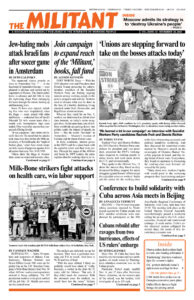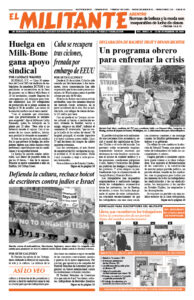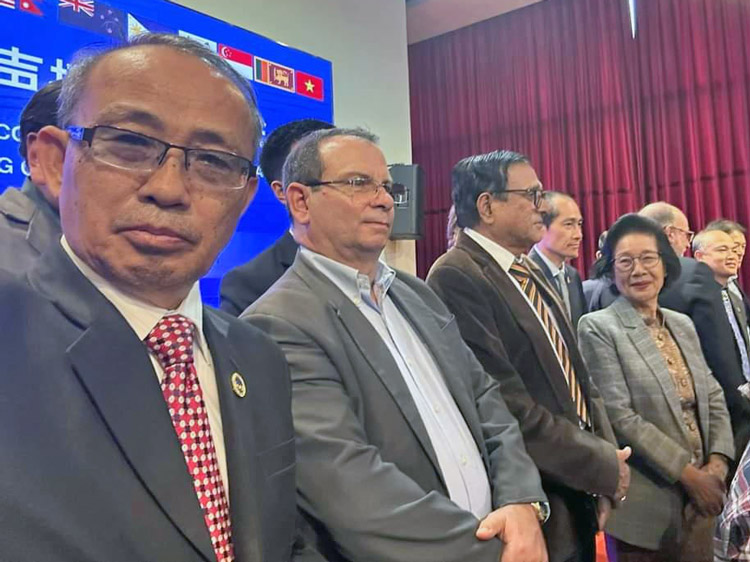BEIJING — The 65-year-long punishing sanctions imposed by Washington against the Cuban people and their socialist revolution were condemned by participants at the 10th Asia-Pacific Regional Conference of Solidarity with Cuba, held here Oct. 29-30. The meeting took place as the United Nations General Assembly overwhelmingly passed a resolution calling for an end to the U.S. rulers’ economic, financial and commercial embargo. A week earlier, Cuba’s entire electrical system collapsed for several days, the result of this decadeslong economic war.
Opening the conference, Fernando González, president of the Cuban Institute for Friendship with the Peoples (ICAP), thanked delegates for all their actions in support of Cuba. He highlighted the historic ties between China and Cuba, which dates back 177 years to the first arrival of Chinese immigrants in Cuba. Cuba was the first Latin American country to establish diplomatic relations with the People’s Republic of China, and today China is Cuba’s largest export market.
Sun Yi, deputy director of the Department of Latin American and Caribbean Affairs at China’s Ministry of Foreign Affairs, told the conference the Cuban government has estimated the cost of the blockade for the 12 months ending in February to be over $5 billion. He joined in condemning Washington’s inclusion of Cuba on its list of State Sponsors of Terrorism, noting, “These measures have profound consequences for the people and affect all sectors, including the most sensitive ones, such as health, food and energy.”
The meeting was hosted for the first time in China as part of celebrations marking the 70th anniversary of the Chinese People’s Association for Friendship with Foreign Countries. The association’s vice president, Yuan Mindao, told the meeting it urges the U.S. government to lift the blockade on Cuba and take it off its terrorism list.
Some 70 delegates from 16 countries and 36 organizations across the Asia-Pacific region took part. They were joined by the Cuban ambassador to China, Alberto Jesús Blanco Silva. Alongside González, the delegation that traveled from Cuba was Alicia Corredera, director of ICAP’s Asia-Pacific division, and Mailin Sánchez, from the tourism organization Amistur Cuba.
Cuba solidarity with world’s peoples
Many delegates voiced gratitude for acts of solidarity by the Cuban Revolution to the peoples of their respective nations. These included assistance with vaccines and medicines in Cambodia, a literacy program for Aborigines in Australia and earthquake relief in Nepal in 2015.
Robert Corpuz, a delegate from the Philippines, described his experiences studying at the Latin American School of Medicine in Cuba, where thousands of students from Asia, the Pacific and elsewhere have been given the opportunity to receive free medical training. “In doing so, we also experienced the hardships of the Cuban people,” he said, “but the Cuban people and government never wavered in their commitment to us, the foreign students, and shared with us what was possible.”
Dong Huy Cuong, vice president of the Vietnam Union of Friendship Organizations, noted that the two countries have close bonds, having “shared the experience of facing a powerful adversary.” Cuba, he said, “inspired others to stand up for national independence. We will never forget Fidel Castro.” In the midst of the liberation war waged by the Vietnamese against Washington and other imperialist powers, which they won in 1975, Castro pledged, “For Vietnam, Cuba is ready to shed its blood.”
Janet Roth from the Communist League in Sydney described examples of working-class resistance in Australia, including among construction workers, nurses and railway workers. She stressed, “the need to learn from the Cuban Revolution and to act to defend it if we are to advance the working-class movement.
“The workers and peasants of Cuba showed what working people are capable of achieving with a revolutionary leadership and program. They showed what is needed to end exploitation and oppression — for the working class to take political power.”
Cuba gives inspiration
The largest delegation from outside China was from Japan. Matsutake Teruyo of the Japan-Cuba Friendship Association praised the example set by the Cuban Revolution. “The victory of the revolution also showed the world that it is possible to overcome the tyranny of a great power with enormous military strength,” she said, “and gave courage to people all over the world.”
“This is an economic war against Cuba that has been going on for over 60 years,” González explained. It was begun in 1960 by the John F. Kennedy administration, acting on a secret State Department memo. “The majority of Cubans support Castro,” the memo said, proposing an economic war that “makes the greatest inroads in denying money and supplies to Cuba, to decrease monetary and real wages, to bring about hunger, desperation, and overthrow of government.”
“The U.S. intention was for the Cuban people to blame their government. This has not happened,” González said. “In the last 10 years it has been tightened in unprecedented ways. To list us as a country that supports terrorism denies Cuba the right to financial assistance. We have been hugely impacted but we will not surrender.”
González expressed his gratitude for the political solidarity shown toward the Cuban Revolution today, adding that material aid is crucial, given the increasing toll of Washington’s sanctions. “Assisting a specific economic project at the local or city level in Cuba is another way to support us,” he said.
Mailin Sánchez gave a special presentation to promote “socio-political tourism as a way of building solidarity among peoples,” including organizing solidarity brigades, conferences and specialized tours.
Annalucia Vermunt from the Auckland Cuba Friendship Society pointed out Washington’s stepped-up enforcement of sanctions is severely impacting Cuba’s tourism industry. Passport holders from New Zealand, Europe and elsewhere are barred from using the convenient ESTA visa waiver for U.S. entry if they have recently visited Cuba.
Educating others about the real history of the Cuban Revolution is key to broadening support for solidarity efforts, she said.
“The solidarity from different countries inspires us to continue to fight,” González said at the end of the conference. “Our victories belong to everyone.”
Janet Roth contributed to this article.


